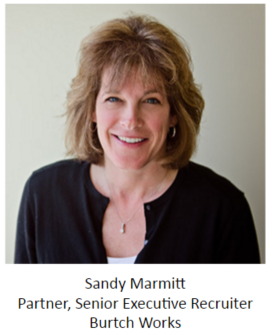The war for analytics talent has become an increasingly hot topic in the analytics space over the past few years. While the exponential growth in the demand for marketing research and analytics talent will continue to present challenges for hiring managers, there are several ways for companies to become more competitive in attracting talent.
I had the opportunity to interview Sandy Marmitt, Partner and Senior Executive Recruiter at Burtch Works, about her vast experience in recruiting analytics professionals. Burtch Works is an executive recruiting firm dedicated to placing highly-qualified marketing professionals with a variety of specialties including marketing research, analytical database marketing, data science, operations research, credit/risk analytics, and traditional marketing science.
 ML: How would you introduce yourself on an airplane?
ML: How would you introduce yourself on an airplane?
SM: I would say I am an executive recruiter in the analytics space. Some people like to use the word “headhunter” but I try to correct them when they say that.
ML: That’s interesting, what do you find unappealing about the word “headhunter”?
SM: The term “headhunter” sounds a bit barbaric. We are more consultative in nature. We work with our candidates and clients to educate both of them and update them on the market and what trends we’re seeing.
ML: What do you tell them about Burtch Works? What does your company do?
SM: We are subject matter experts in the marketing analytics and insights vertical. We have different departments here that focus on various specialized divisions of marketing. We have a market research area, and also recruiters that specialize in advanced analytics from analyst to senior leaders.We also specialize in the digital and web analytics area, and financial services, such as credit and risk marketing. We follow people throughout their career, whether or not they have been in the business for over 30 years. So we know how to distinguish the people that look good on paper versus those who are good in the business. People come to us because of our expertise, and because of that we’ve seen people grow in their careers.
ML: As I focus on industry trends, I have read a number of reports projecting a shortage of analytics talent. What can companies do to overcome this challenge?
SM: First and foremost, the change in the market over the past few years has become extremely competitive. Companies need to be competitive in regards to their hiring process because they will be dealing with candidates that have multiple opportunities. This wasn’t the case before. One way to be competitive is to pay more, which isn’t always possible when you’re going up against the larger corporations like Amazon and such. So companies have to get a bit creative and think about other forms of compensation, such as maybe a flexible work arrangement or allowing people to work from home a day or two. Some companies that are out in the suburbs might not be as attractive, so they have set up a small satellite office in urban areas to attract younger talent. We have seen companies offer to allow commute time to be counted towards the work day. I think in order to deal with the competitive nature you have to pick up the pace on the recruiting itself. Basically in this business now, you snooze, you lose. Candidates move on if they don’t hear from you. Courting the candidates and staying in communication with them really helps in the recruiting process.
ML: I keep reading about an “employer’s brand”. If an organization hasn’t established a clear employer brand, where do they start?
SM: Well now everything is done through the web so there is a lot of information that people are getting through blogs, social media, and Glassdoor. You want to make sure your company is being represented correctly. People take social media very seriously as a branding tool and word of mouth is very important. It is a small industry and people talk with their friends about their experiences.
In terms of the interview process, make sure it’s a pleasant one. Make it comfortable and succinct. The recruiting process very oftentimes lends itself to how the company organizes itself.
ML: What verticals or industries tend to be the most active in recruiting talent for digital analytics positions?
SM: I would say the retailers are the ones that jumped on the digital area first because of online marketing. Agencies that support these verticals became popular because they are the vendors that are supposed to help retailers learn about ways to attract visitors to a site. CPG companies tend to be more classically trained, but I believe they’re catching up right now. The retailers are much more progressive about coming out with the newest and greatest in terms of the digital space.
ML: What are some of the key challenges companies are experiencing in their recruitment efforts? How does working with Burtch Works help overcome these challenges?
SM: I think one consistent challenge we hear is that they have worked internally trying to hire somebody, but their recruiters don’t really understand the market or the skill sets they are looking for. Also there is the competitive landscape that we talked about. Maybe they are moving too slow and they’re missing out on candidates. When you work with a specialized recruiting firm you are able to get a little more value in terms of what the candidate is thinking or looking for. When the candidate is dealing directly with the company, they aren’t going to share their other [interview] activities they have going on. They aren’t going to share their true feelings because they are potentially talking with their future boss. A recruiter is able to get that information from the candidate and then present it to you the employer. This lets you know that you have to do certain things to woo a particular candidate.
ML: As you think strategically about your own organization, how do you predict your services will evolve over the next five years?
SM: Yes, this is constantly evolving. There are new skills being created daily. Especially in the programmatic and digital advertising areas that are growing quickly. There are new skills that sometimes the schools aren’t even keeping up on which contributes to the shortage of talent. The challenge I see is that the inventory of candidates is not going to be as robust as we move into the future.
ML: A digital analyst is always staying on top of emerging technologies. What current proficiencies do you see as the most sought after by your clients?
SM: A lot of these candidates capture the information and then have to present the insights to senior management. I know that Tableau and QlikView are important. SQL is important to pull the data. A lot of people are also using Omniture or CoreMetrics.
ML: One of the things I found interesting in your report, “Advice for Hiring Analytics & Marketing Research Professionals”, is that you advise not to look for the perfect candidates or “unicorns”. What should we look for in analytics professionals?
SM: I think it is important to see how your candidates think. Presentations, being polished, and collaborating with other departments are important skills that we are seeing now. Before, companies would hire the folks that could pull the data, analyze it, and stay in their corner. Now, they want folks that can manipulate the data and then translate findings or insights to senior management. Companies want someone who has experience and a comfort level which makes personality traits and soft skills important as well. When we originally get a job description sometimes we have to look at it as a wish list. You’re not going to get a candidate that has all of those things, so you need to really prioritize what skills the client is looking for and what they can train on quickly.
ML: To your point often times job descriptions can be very broad because the company doesn’t know what to ask for, or they are so specific that it’s impossible to find this unicorn. How do you balance the two when writing a compelling job description?
SM: That’s why it’s so important for us to talk to hiring managers to find out what exactly they are looking for. What is the skill set they really need? And then we hone in on that. We are not experts at writing job descriptions; we are experts at interpreting them.
ML: What is your favorite interview question when screening candidates?
SM: A lot of times I will talk with the candidate about a particular project they have worked on or have them go through what their day-to-day looks like. This gives me a better idea of the specific tools they use, the departments they are collaborating with, and their level of management experience such as mentoring, managing, and training.
ML: What are your thoughts on having candidates do presentations during the recruitment process?
SM: That has become a very popular part of the client’s interview process once the candidate gets past the phase of the initial conversation with HR or the hiring manager. A case study presentation is something I am seeing more and more of. Companies are realizing that they need to see how this person thinks rather than just having them answer questions.
ML: Because of companies like Google, many companies are reviewing their own perks. What are some perks that have now become industry standards?
SM: We have some data about that. We asked people in our database what perks they are most likely to get from their companies. The most common ones are flexible hours, work from home opportunities, unlimited PTO, food and coffee in the office, team bonding, social activities, and health and fitness benefits. Those are some perks that are big for people. Then you get into the more unique or rare perks which are concierge services, video games, Foosball tables, on site gyms, nap rooms, dry cleaning, etc.
ML: What are some common mistakes you see companies make during the hiring process?
SM: Communication and pace are two of the big ones. You can’t sit on a resume for a week before doing a phone screening. Keep the process going in a timely manner. If a company waits a week or two at every stage in the interview process the candidate is going to move on or get snatched up by another company. It also just doesn’t look good, because it typically gives insight as to what it might look like to work for that company. Are processes going to be slow? Are you going to be waiting on making decisions? You can really tell a lot about a company by the way they recruit.
Resources:
1. Connect with Sandy Marmitt – LinkedIn
2. Additional reading: If You Want to Hire Quants, Fix Your Hiring Process – by Burtch Works
3. Flash Survey Results: Which Analytics Pros Get the Best Perks? – survey conducted by Burtch Works
4. Download the Burtch Works Studies: Salaries for Data Science, Predictive Analytics, and Marketing Research Professionals


